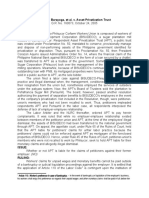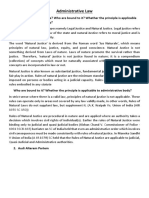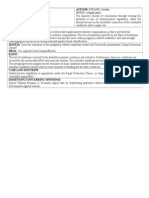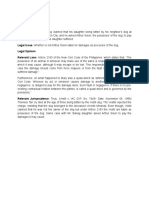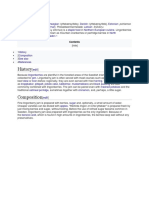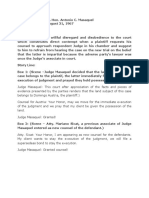Exhaustion of Administrative Remedies
Exhaustion of Administrative Remedies
Uploaded by
R.A. GregorioCopyright:
Available Formats
Exhaustion of Administrative Remedies
Exhaustion of Administrative Remedies
Uploaded by
R.A. GregorioOriginal Description:
Copyright
Available Formats
Share this document
Did you find this document useful?
Is this content inappropriate?
Copyright:
Available Formats
Exhaustion of Administrative Remedies
Exhaustion of Administrative Remedies
Uploaded by
R.A. GregorioCopyright:
Available Formats
Exhaustion of Administrative Remedies
It has been consistently held by the Supreme Court, in a long line of cases, that before a party is allowed to seek the intervention of the court, it is a pre-condition that he should have availed of all the means of administrative processes afforded him. Hence, if a remedy within the administrative machinery can still be resorted to by giving the administrative officer concerned every opportunity to decide on a matter that comes within his jurisdiction, then such remedy should be exhausted first before the courts judicial power can be sought. The premature invocation of a courts intervention is fatal to ones cause of action as aptly explained by the Supreme Court in the case of University of the Philippines v. Catungal, Jr., et al., (G.R. No. 121863, May 5, 1997), to wit: The underlying principle of the rule on exhaustion of administrative remedies rests on the presumption that the administrative agency, if afforded a complete chance to pass upon the matter, will decide the same correctly. There are both legal and practical reasons for the principle. The administrative process is intended to provide less expensive and more speedy solutions to disputes. Where the enabling statute indicates a procedure for administrative review and provides a system of administrative appeal or reconsideration, the courts for reasons of law, comity, and convenience will not entertain a case unless the available administrative remedies have been resorted to and the appropriate authorities have been given an opportunity to act and correct the errors committed in the administrative forum. The rule in administrative law is that parties requesting judicial action must first exhaust their remedies in the executive branch. This is premised not only on practical considerations but also on the comity existing between different departments of the government, which comity requires the court to stay their hands until the administrative processes have been completed. (Madrinan vs. Sinco, 110 Phil. 160) Further, under the doctrine of exhaustion of administrative remedies, recourse through court action, as a general rule, cannot prosper until all the remedies have been exhausted at the administrative level, (Pacana vs. Consunji, 108 SCRA 631[1981]; Pestaas et al. v. Dyogi, et al., 81 SCRA 574 [1978]; Antonio v. Tanco, 65 SCRA 448 [1975]). Thus, in Abe-Abe et al. v. Manta (90 SCRA 524, 531 [1979]), the Supreme Court emphatically declared: When an adequate remedy may be had within the Executive Department of the government, but nevertheless, a litigant fails or refuses to avail himself of the same, the judiciary shall decline to interfere. This traditional attitude of the courts is based not only on convenience but likewise on respect; convenience of the party litigants and respect for a co-equal office in the government. If a remedy is available within the administrative machinery, this should be resorted to before resort can be made to (the) court. (citing Cruz vs. Del Rosario, 119 Phil. 63, 66). There is no question that a statute may vest exclusive original jurisdiction in an administrative agency over certain disputes and controversies falling within the agencys special expertise. For example, the constitutionality of such grant of exclusive jurisdiction to the Housing and Land Use Regulatory Board over cases involving the sale of lots in commercial subdivisions was upheld in Tropical Homes Inc. v. National Housing Authority (152 SCRA 540 [1987]) and again sustained in a later decision in Antipolo Realty Corporation v. National Housing Authority (153 SCRA 399 [1987]) where the Supreme Court restated that the HLURB shall have exclusive jurisdiction to regulate the real estate trade and business in accordance with the terms of PD 957 which defines the quantum of judicial or quasi-judicial powers of the said agency.
As a result, the HLURB, in the exercise of its powers and functions, is authorized to interpret and apply contracts, determine the rights of the parties under these contracts, and even award damages, such as moral and exemplary, whenever appropriate. Thus, it has been held that one of the thrusts of the multiplication of administrative agencies is the interpretation of such contracts and agreements and that the determination of private rights under these agreements is no longer a uniquely judicial function. Moreover, if a remedy is very much available within the administrative machinery of the administrative agency, then this alternative should first be utilized before resort can be made to the courts, not only to give the administrative agency the opportunity to decide the matter by itself correctly, but also to avoid the very pernicious evil the doctrine itself seeks to prevent the unnecessary and premature resort to courts and the clogging of its dockets. It is also important to note that the primordial effect of non-compliance and failure to exhaust administrative remedies is that it deprives the complainants of a cause of action, which is, under the Rules of Court, a ground for a motion to dismiss. Such failure, therefore, is fatal and calls for the dismissal of the case.
You might also like
- Bausch & Lomb - Case AnalysisDocument48 pagesBausch & Lomb - Case AnalysisSandeep Kumar67% (3)
- A Guide To Answering Problem Question With ILAC MethodDocument3 pagesA Guide To Answering Problem Question With ILAC MethodnorshaheeraNo ratings yet
- Doctrine of Exhaustion Administrative RemedyDocument10 pagesDoctrine of Exhaustion Administrative Remedyramilfleco100% (4)
- Judicial Review of Administrative Remedies FINALDocument52 pagesJudicial Review of Administrative Remedies FINALMarriel Fate Cullano100% (2)
- Evidence Outline UT LawDocument95 pagesEvidence Outline UT LawsamcriswellNo ratings yet
- Administrative Justice An Overview of Civil Service Law and RulesDocument43 pagesAdministrative Justice An Overview of Civil Service Law and RulesWella Mallory ArmentaNo ratings yet
- Asian Institute of Management vs. Asian Institute of Management Faculty AssociationDocument16 pagesAsian Institute of Management vs. Asian Institute of Management Faculty AssociationIyaNo ratings yet
- Remedial Law Case Digest 2014 2015Document83 pagesRemedial Law Case Digest 2014 2015georgina616100% (2)
- Contracts of AdhesionDocument1 pageContracts of Adhesiondermawan_salimNo ratings yet
- Civ Pro Cases - JurisdictionDocument458 pagesCiv Pro Cases - JurisdictionMa Ra100% (2)
- Leading QuestionDocument8 pagesLeading QuestionJanin GallanaNo ratings yet
- Torts and Damages: San Beda College of LawDocument32 pagesTorts and Damages: San Beda College of Lawchryan1989No ratings yet
- Provisional Remedies (CASES)Document37 pagesProvisional Remedies (CASES)pasmoNo ratings yet
- PMI Colleges V NLRCDocument7 pagesPMI Colleges V NLRCchavit321No ratings yet
- Rules of Procedure On Corporate RehabilitationDocument13 pagesRules of Procedure On Corporate RehabilitationRam SVNo ratings yet
- Labor 2 - OUTLINE PDFDocument107 pagesLabor 2 - OUTLINE PDFCHRISTINENo ratings yet
- Types of MandamusDocument2 pagesTypes of Mandamusamitmohanty49No ratings yet
- Lecture 2 - Pre-Trial ConsiderationsDocument35 pagesLecture 2 - Pre-Trial ConsiderationsTwain JonesNo ratings yet
- Free Access To Courts Case DigestsDocument8 pagesFree Access To Courts Case Digestsejusdem generisNo ratings yet
- 4 - Barayoga V AssetDocument2 pages4 - Barayoga V AssetKriselNo ratings yet
- Challenging An Arbitration AwardDocument22 pagesChallenging An Arbitration AwardPS PngnbnNo ratings yet
- International School V QuisumbingDocument8 pagesInternational School V QuisumbingMelgenNo ratings yet
- Title and Definitions: Chan Robles Virtual Law LibraryDocument36 pagesTitle and Definitions: Chan Robles Virtual Law LibrarykimNo ratings yet
- Philippine Local GovernanceDocument12 pagesPhilippine Local GovernanceAlizaReforminaNo ratings yet
- Rule 38 - Relief From JudgmntsDocument6 pagesRule 38 - Relief From JudgmntsCecil BernabeNo ratings yet
- Separation of Powers PDFDocument6 pagesSeparation of Powers PDFMirza SaquibNo ratings yet
- People vs. Tan Boon Kong (1930)Document3 pagesPeople vs. Tan Boon Kong (1930)Mark De JesusNo ratings yet
- Administrative LawDocument1 pageAdministrative LawLowlyLutfurNo ratings yet
- Declaratory Relief NotezzzDocument8 pagesDeclaratory Relief NotezzzJohn PaumigNo ratings yet
- Rule 66 Quo WarrantoDocument3 pagesRule 66 Quo WarrantoAnonymous 6RlpyJMAZpNo ratings yet
- 2021 Labor Law ObjectiveDocument7 pages2021 Labor Law ObjectiveAldrin OmpadNo ratings yet
- Dumpit-Murillo v. CADocument3 pagesDumpit-Murillo v. CAKara SolidumNo ratings yet
- International Law QuestionsDocument4 pagesInternational Law QuestionsNURUL A'TIKAHNo ratings yet
- Labor Relations - Finals ReviewDocument6 pagesLabor Relations - Finals ReviewiesumurzNo ratings yet
- 1 Principles Doctrines RulingsDocument6 pages1 Principles Doctrines RulingsDeborah Grace ApiladoNo ratings yet
- Remedial Law JurisprudenceDocument424 pagesRemedial Law Jurisprudencealexes24No ratings yet
- IMPLEMENTING RULES AND REGULATIONS of RA 11642Document103 pagesIMPLEMENTING RULES AND REGULATIONS of RA 11642Evelyn BeltranNo ratings yet
- Liabilities of Parties: Regulatory Framework and Legal Issues in BusinessDocument7 pagesLiabilities of Parties: Regulatory Framework and Legal Issues in BusinessPhryz PajarilloNo ratings yet
- Pleaders So That On The Basis Thereof, Evidence May Be Adduced For The Judgment of The CourtDocument7 pagesPleaders So That On The Basis Thereof, Evidence May Be Adduced For The Judgment of The CourtManuelMarasiganMismanosNo ratings yet
- Labor Standards (Outline)Document15 pagesLabor Standards (Outline)Duane VillaNo ratings yet
- Civil Procedure Study GuideDocument24 pagesCivil Procedure Study GuideDino CrupiNo ratings yet
- Course Outline ReviewerDocument12 pagesCourse Outline Reviewerjmd.besanaNo ratings yet
- Labor Law Transcript - ChanDocument1 pageLabor Law Transcript - ChanPau JoyosaNo ratings yet
- Occupational Health and Safety Issues Among Nurses in The PhilippinesDocument4 pagesOccupational Health and Safety Issues Among Nurses in The PhilippinesDani CawaiNo ratings yet
- The 1997 Rules of Civil ProcedureDocument119 pagesThe 1997 Rules of Civil ProcedurelengjavierNo ratings yet
- 9) Geduldig v. Aiello - EscanoDocument1 page9) Geduldig v. Aiello - EscanoJovelan V. EscañoNo ratings yet
- Writ of Habeas CorpusDocument31 pagesWrit of Habeas CorpusRoe DirectoNo ratings yet
- Canezo vs. RoxasDocument9 pagesCanezo vs. RoxasMarites regaliaNo ratings yet
- GR 137592 Ang Mga Kaanib Sa Iglesia Vs Iglesia NG DiosDocument4 pagesGR 137592 Ang Mga Kaanib Sa Iglesia Vs Iglesia NG DiosNesrene Emy LlenoNo ratings yet
- Remedies PDFDocument169 pagesRemedies PDFJaimie Paz AngNo ratings yet
- 03-King of Kings Transport, Inc. Vs Mamac - Case DigestDocument3 pages03-King of Kings Transport, Inc. Vs Mamac - Case DigestthelawanditscomplexitiesNo ratings yet
- Revised Law Student Practice Rule: RULE 138-A A.M. NO. 19-03-24-SC JUNE 25, 2019Document35 pagesRevised Law Student Practice Rule: RULE 138-A A.M. NO. 19-03-24-SC JUNE 25, 2019Jam RxNo ratings yet
- CH 5 - Admin LawDocument5 pagesCH 5 - Admin Lawinagigi13No ratings yet
- Powers of The President What Are The Powers of The PresidentDocument59 pagesPowers of The President What Are The Powers of The PresidentEugene DayanNo ratings yet
- 5 Legal Concepts of Law.Document2 pages5 Legal Concepts of Law.Ahmad Faris90% (10)
- When Is A Donation PerfectedDocument7 pagesWhen Is A Donation PerfectedjcgalamgamNo ratings yet
- 1 Titling IntroductionDocument36 pages1 Titling IntroductionTotch Dela Cruz100% (1)
- Petition for Certiorari Denied Without Opinion: Patent Case 98-1972.From EverandPetition for Certiorari Denied Without Opinion: Patent Case 98-1972.No ratings yet
- Doctrine of Non-InterferenceDocument3 pagesDoctrine of Non-Interferenceleslie ann raseNo ratings yet
- Primary Jurisdiction and Exhaustion of Administrative RemediesDocument23 pagesPrimary Jurisdiction and Exhaustion of Administrative RemediesFernan Del Espiritu Santo100% (3)
- Doctrine of Exhaustion of Administrative Remedy Ramil F. de JesusDocument5 pagesDoctrine of Exhaustion of Administrative Remedy Ramil F. de JesusramilflecoNo ratings yet
- Music Describes Three Interrelated Uses of The Term "Music Theory"Document1 pageMusic Describes Three Interrelated Uses of The Term "Music Theory"R.A. GregorioNo ratings yet
- PussyDocument4 pagesPussyR.A. GregorioNo ratings yet
- StellarDocument1 pageStellarR.A. GregorioNo ratings yet
- Boat Jetty Cargo Ships Cruise Ships Ferries Yachts ElastomerDocument1 pageBoat Jetty Cargo Ships Cruise Ships Ferries Yachts ElastomerR.A. GregorioNo ratings yet
- Hawking RadiationDocument2 pagesHawking RadiationR.A. GregorioNo ratings yet
- Asteroid BeltDocument2 pagesAsteroid BeltR.A. GregorioNo ratings yet
- Assignment 2Document1 pageAssignment 2R.A. GregorioNo ratings yet
- A) Death B) Reclusion Perpetua: Indivisible PenaltiesDocument12 pagesA) Death B) Reclusion Perpetua: Indivisible PenaltiesR.A. GregorioNo ratings yet
- Monochromatic Colors Are All The Colors (Tones,: Tints and Shades HueDocument1 pageMonochromatic Colors Are All The Colors (Tones,: Tints and Shades HueR.A. GregorioNo ratings yet
- Bobby Drake: Iceman (Robert Louis "Bobby" Drake) Is A FictionalDocument2 pagesBobby Drake: Iceman (Robert Louis "Bobby" Drake) Is A FictionalR.A. GregorioNo ratings yet
- DeferralsDocument1 pageDeferralsR.A. GregorioNo ratings yet
- Kaiser Permanente (Document1 pageKaiser Permanente (R.A. GregorioNo ratings yet
- AnimesDocument1 pageAnimesR.A. GregorioNo ratings yet
- LZK Holdings Development Corp. vs. Planter Development Bank FULL TEXTDocument5 pagesLZK Holdings Development Corp. vs. Planter Development Bank FULL TEXTR.A. Gregorio0% (1)
- History: Vaccinium Vitis-IdaeaDocument1 pageHistory: Vaccinium Vitis-IdaeaR.A. GregorioNo ratings yet
- Lingonberry JamDocument1 pageLingonberry JamR.A. GregorioNo ratings yet
- 2011 Bar Exam RemDocument15 pages2011 Bar Exam RemR.A. GregorioNo ratings yet
- Jurisdiction CasesDocument40 pagesJurisdiction CasesR.A. GregorioNo ratings yet
- Ramiscal vs. OrroDocument2 pagesRamiscal vs. OrroR.A. GregorioNo ratings yet
- 2 Prohibited Motions and PleadingsDocument2 pages2 Prohibited Motions and PleadingsR.A. GregorioNo ratings yet
- Marsada vs. MonterosoDocument2 pagesMarsada vs. MonterosoR.A. GregorioNo ratings yet
- LokiDocument1 pageLokiR.A. GregorioNo ratings yet
- Austria vs. Hon. Masaquel Doctrinal DigestDocument3 pagesAustria vs. Hon. Masaquel Doctrinal DigestR.A. GregorioNo ratings yet
- Mcdonalds Vs LC Big MakDocument20 pagesMcdonalds Vs LC Big MakR.A. GregorioNo ratings yet
- b.07 - Villongco Vs Moreno, GR L-17240Document4 pagesb.07 - Villongco Vs Moreno, GR L-17240R.A. GregorioNo ratings yet
- IHS Markit Flash Eurozone PMI: News ReleaseDocument4 pagesIHS Markit Flash Eurozone PMI: News ReleaseAdam SamsonNo ratings yet
- CIPM Exam_Page 5 _ ExamTopicsDocument26 pagesCIPM Exam_Page 5 _ ExamTopicskayleesocoolNo ratings yet
- THE $1.00 A DAY Strategy: Facebook AdvertisingDocument27 pagesTHE $1.00 A DAY Strategy: Facebook AdvertisingSeong Ah KeeNo ratings yet
- Protego India PVT LTDDocument36 pagesProtego India PVT LTDSurabhi SaxenaNo ratings yet
- Aef4 Quiz # 9Document3 pagesAef4 Quiz # 9Ich Liebe100% (1)
- Quotation Catia (Cidec) Oc - Ysc For Ads - 11-4-2023Document2 pagesQuotation Catia (Cidec) Oc - Ysc For Ads - 11-4-2023PKB SejahteraNo ratings yet
- Phân Tích Dữ Liệu MarketingDocument9 pagesPhân Tích Dữ Liệu MarketingKIM HUỆ BÙI THỊNo ratings yet
- Inspection & Test Plan (Itp) AcsDocument2 pagesInspection & Test Plan (Itp) Acssheb_khaleelNo ratings yet
- FVDB Andro $99,635,600 PT BintangDocument2 pagesFVDB Andro $99,635,600 PT Bintangandy leeNo ratings yet
- Chapter Two: Principles of Accounting and Financial Reporting For State and Local Governments (SLGS)Document55 pagesChapter Two: Principles of Accounting and Financial Reporting For State and Local Governments (SLGS)Bilisummaa GeetahuunNo ratings yet
- Minutes of The MeetingDocument3 pagesMinutes of The MeetingGuiller M GumpadNo ratings yet
- Wrap-Up Quiz Week 5 - Human Resource Management-T223PWB-1Document12 pagesWrap-Up Quiz Week 5 - Human Resource Management-T223PWB-1teakjyyNo ratings yet
- EOI FormDocument4 pagesEOI Formsaqirshaikh7No ratings yet
- Coos and Ai:: Nailing The ScaleDocument10 pagesCoos and Ai:: Nailing The ScaleZeeNo ratings yet
- JPMorgan Econ FI-China FX Reserves A Touch Above Expectation Two-Sided Risks... - 110660083Document9 pagesJPMorgan Econ FI-China FX Reserves A Touch Above Expectation Two-Sided Risks... - 110660083hyp7409No ratings yet
- ACCO 20123 Financial Management 1st SemesterDocument18 pagesACCO 20123 Financial Management 1st SemesterCass MadriagaNo ratings yet
- RAK Cement - Q001R1AMC10631221Document2 pagesRAK Cement - Q001R1AMC10631221Fire Technical ServicesNo ratings yet
- Business CaseDocument1 pageBusiness CaseHarpreet KaurNo ratings yet
- PMJ 20052Document16 pagesPMJ 20052igorsivachev26No ratings yet
- Alejandra's ResumeDocument9 pagesAlejandra's ResumeUr's CvaNo ratings yet
- Sanskriti School Dr. S. Radhakrishnan Marg New DelhiDocument7 pagesSanskriti School Dr. S. Radhakrishnan Marg New DelhiAVNEET XII-CNo ratings yet
- Aashto Publications Order FormDocument1 pageAashto Publications Order Formhilander2k2No ratings yet
- MetaForce 2Document24 pagesMetaForce 2temple samNo ratings yet
- Gaba Corporation Interview Questions Answers GuideDocument13 pagesGaba Corporation Interview Questions Answers GuideNdibang RobinsonNo ratings yet
- An Application of Fuzzy Delphi and Fuzzy Ahp On Evaluating 4qxlincxjvDocument12 pagesAn Application of Fuzzy Delphi and Fuzzy Ahp On Evaluating 4qxlincxjvHẠNH PHẠM HIẾUNo ratings yet
- Unit7 2Document2 pagesUnit7 2jennie rubyNo ratings yet
- Trax October ProposalDocument30 pagesTrax October ProposalBilal AhmedNo ratings yet
- Virging Dump Trans-PlfDocument2 pagesVirging Dump Trans-PlfOsvaldo MauceriNo ratings yet
- Black and Red Elegant Corporate Marketing Plan PresentationDocument6 pagesBlack and Red Elegant Corporate Marketing Plan Presentationmuhammed ajasNo ratings yet



















